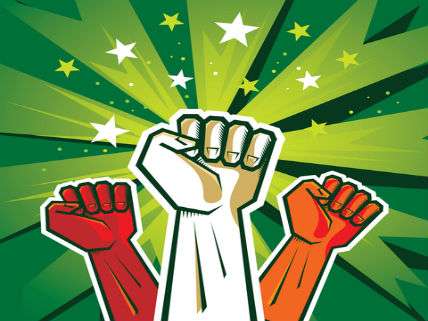Did Conservatives Replace a 'Red Scare' with a 'Green Scare'?
"I believe that the color of radicalism today is not red, but green."

After the Soviet Union collapsed in 1991, conservatives saw environmentalism as replacement for the bogeyman of communism—or at least that's what FiftyThirtyEight science reporter Maggie Koerth-Baker declared on NPR's Science Friday. In the '90s, she noted, some conservatives started calling environmentalists "watermelons": "green on the outside, red on the inside." Host Ira Flatow chuckled disbelievingly.
But Koerth-Baker has her history backwards: Lots of reds did turn green in the 1990s. Unmoored socialists cast about for some other theory explaining how capitalism would destroy itself. They began adopting and expanding upon the arguments of radical environmentalists, who had been arguing that capitalism will collapse because the pollution produced by its heedless overconsumption will build to an ecological breaking point.
And that line of argument is still with us today. For example, activist Naomi Klein asserts that climate science is "the most powerful argument against unfettered capitalism" ever.
First some background. In a June 1 article titled "The Paris Agreement Would Have Been Less Partisan 30 Years Ago," Koerth-Baker pointed out that environmentalism in the 1970s and '80s was much more bipartisan affair. Data from the League of Conservation Voters shows that the spread between congressional Democrats and Republicans on votes for environmental legislation was not all that big in that period. That wasn't just because the parties themselves were more of an ideological mix back then: In 1990, according to General Social Survey data, 75 percent of both self-described conservatives and self-described liberals thought national spending on the environment was "too little."
Since then it's been all downhill for environmental bipartisanship. "After the 1991 fall of the Soviet Union, the conservative movement replaced the 'Red Scare' with a new 'Green Scare' and became increasingly hostile toward environmental protection," according to the researchers that Koerth-Baker cites. Those same researchers point to a 2008 Environmental Politics article, "The Organization of Denial: Conservative Think Tanks and Environmental Scepticism," that surveyed 141 "skeptical books" published since 1992. The researchers found that 92 percent of those texts "are linked to conservative think tanks." (For what it's worth, their list includes four books either written or edited by me.)
So what was going on at the beginning of the last decade of the 20th century?
In her prescient 1990 article "The Green Road to Serfdom," Reason's Virginia Postrel probed the ideological foundations of environmental politics. She carefully dissected environmentalism as "a full-fledged ideology" that is "every bit as powerful as Marxism and every bit as dangerous to individual freedom and human happiness."
As the early '90s wore on, you could see that ideology starting to step in for the Marxists. In a 1990 Z Magazine article, activist Brian Tokar—now a lecturer in social ecology at the University of Vermont—noted that Green political activists were aiming to build "a hopeful alternative voice in a period characterized by a distinct shortage of idealism on the left." In 1991 another social ecologist, the left-anarchist Murray Bookchin, announced that "the immediate source of the ecological crisis is capitalism," which he pointedly called "a cancer on the biosphere." (He added, "I believe that the color of radicalism today is not red, but green.") At the 1992 Earth Summit in Rio de Janeiro, the Worldwatch Institute's Chris Flavin declared that with socialism in disrepute, environmentalism was now the "most powerful political ideal today."
Even a relatively conventional politician like then-Sen. Al Gore, in his 1992 book Earth in the Balance, made the totalistic claim that "we must make the rescue of the environment the central organizing principle for civilization."
Yet green ideologues have also been haunted by fears that human ingenuity will solve the environmental problems they're counting on to destroy the socioeconomic system they abhor. As climate activist Bill McKibben wrote in his 1989 book The End of Nature, "It's not certain that genetic engineering and macromanagement of the world's resources will provide a new cornucopia, but it certainly seems probable. We are a talented species." He didn't say this with relief—it was a lament. (As it happens, the World Bank reported in 2015 that for the first time in history less than 10 percent of the world's population lives in absolute poverty.)
As I noted in my review of Naomi Klein's This Changes Everything: Capitalism vs. the Climate, the author "acidly dismisses reliance on science, technology, and markets to address the problems of climate change as embodying the attitude that 'We will triumph in the end because triumphing is what we do.' Well, yes. And that's a much better bet than imagining the laws of nature mandate a post-capitalist utopia."
The upshot: Conservatives were not conjuring a new "scare" to replace the bogeyman of Soviet Communism. They were tracking the intellectual metamorphosis of many reds into greens after the collapse of "actually existing socialism" in 1991.


Show Comments (117)